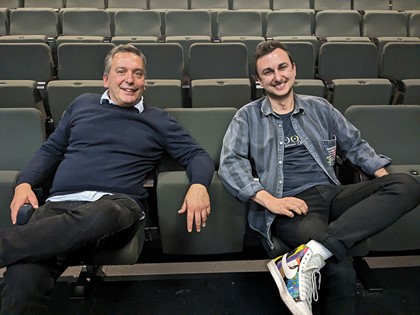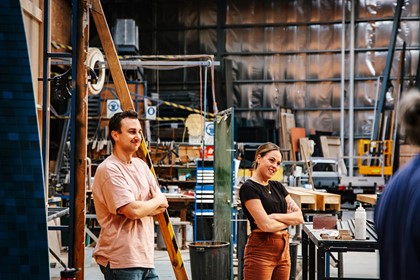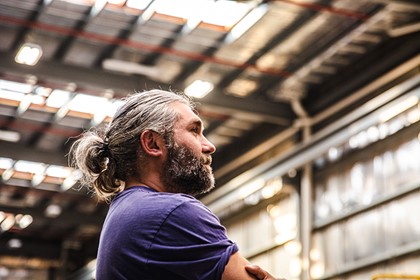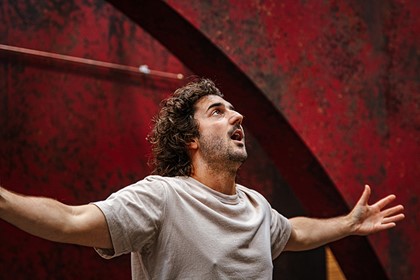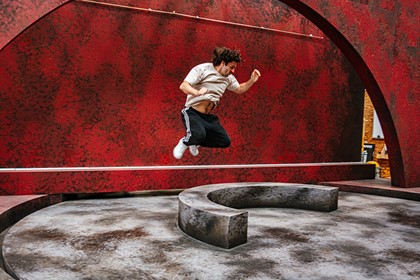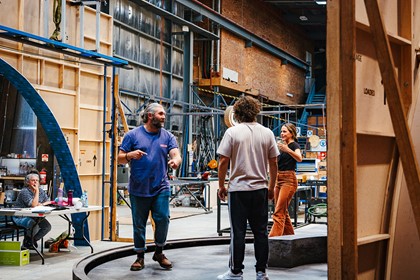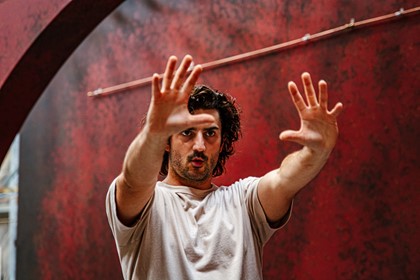In Conversation with Christos Tsiolkas
By Christos Tsiolkas & Kitan Petkovski
Posted May 03, 2023
KITAN
I just wanted to start by saying how much I have enjoyed being in the room on Loaded. I read the novel a couple of years ago, when the show was first announced at the Malthouse. I couldn't believe that a book like that was published in the 90s, followed by the incredible movie adaptation. I just thought it was so revolutionary for queer culture and for gay wog men to be represented in such an authentic way at a time when many of us still lived closeted lives.
CHRISTOS
Thank you. I mean, it was a really exciting time in the 90s, you've got to understand for a lot of us, we were coming out of the HIV AIDS era. I was a late teen when the first cases of AIDS were becoming visible. So, it was quite a frightening time because of the homophobia that came with that, but it was also a galvanising time, you know, when you're dealing with questions of life and death. Friends are dying, so the stakes are really raised. This is only in retrospect, you understand, and in a way, it's politicised us all. And it wasn't only necessarily gay men. It was everyone who was passionate about the world. And it was also growing up in the shadow of nuclear threat and the cold war, and that disappeared in the late 80s. There was an end to communism and this state that we thought was going to be a permanent part of our lives forever. So everything was in flux and it was a really terrifying time, an angering time, but it was also exciting. And so what I'm trying to say is that Loaded didn't come out of nowhere. I think that it came out of all those things happening in the culture.
I didn't feel like I was revolutionary. I felt like I was trying to speak my truth, and my truth was being a queer wog kid, you know, and trying to make sense of that.
That's where it all came from. I’d been writing short stories, and I remember all the writers at that time were going ‘Why don't you change your name? Why are you writing about Greek characters?’ and I was like, fuck off. No one's gonna ask you why you're writing an Anglo character. This is my name. This is my world. Why do I need to hide that? And so that riskiness, I think that's a real difference. I don't want to romanticise the past, but I think there was something exciting about that sense of ‘Well, the normal rules don't apply anymore’.
Let me ask you, does it feel like the past when you read a book like Loaded? Because that's one of the things Dan and I have worked on in this. I call it a ‘call and response’ between the past and now.
KITAN
Sadly, it doesn't. And I say sadly because I know people, young men in particular, that are still culturally tied to their East European or European culture, that doesn't allow them to be their true selves. I think a story like this will be very affecting for a lot of young men.
I want to start talking a little bit about the play because we're working on it at the moment and this is being done in collaboration between yourself and the lovely Dan Giovannoni. What is the one thing that you've really enjoyed about this collaborative process, and what is one thing that you've learnt doing this adaptation with Dan?
CHRISTOS
What I’ve really enjoyed is the closeness of collaboration, the generosity. I met Dan through Stephen, when Dan adapted Merciless Gods, which is a collection of short stories of mine, and I was so impressed, I was just really ecstatic about what they did in that play. So, I knew I wanted to work with these people, like I just knew it instinctively. I knew it too because they understood where I was coming from I think because of the shared migrant history. In terms of the actual process, I love Dan's generosity as a writer, and as a collaborator. But I also love that he has a real confidence in language. Theatre’s never felt like my natural home because, you know, it's novels and it's cinema and poetry really that have been my guides into the arts. But I've loved working in theatre and I actually think what Dan does is he gives a real poetic sensibility that doesn't feel forced. He actually was able to kind of hone into what the poetry is in Loaded and, because he's such a skilful playwright, find the way with a really sparse minimalism to bring that poetry across. And that's just been an education for me.
KITAN
Since the book was published in ‘95, Loaded was adapted into a feature film, an audio play in 2020 and now, as a main stage production. How has your relationship with the story changed over the years and with these different art forms?
CHRISTOS
Sometimes I look back at both the young man who wrote that book and Ari, and I think ‘Oh God, do I recognise you?’ And I do, I do. I recognise them both in the way you recognise someone who's part of you.
There's something about the medium of theatre that makes it easy for me to actually go, ‘I've done the book, what is it about the medium that you're in or that you're using that's really different?’
There’s something about the immediacy of stage.
I don't think of Alex Dimitriades and I don't think of Christos Tsiolkas when I'm watching Danny because he's doing something completely different that film can't do and the novel can't do. He as an actor can embody, Ari, of course, who's the main character, but he's also Johnny Tooler and he's the mother Sophia and he's Joe, and he's Betty, and he's Serena. And that's what I think is magical about the theatre experience, right? I think that's what's exciting about working with Dan, for example, because I think instinctively, he knows about what theatre can do. I'm always conscious that I don't come to the theatre to simulate what happens when I go to the cinema. I come to it because there's something that happens in theatre, in the live moment, that is just different sensations.
KITAN
In the play we see Ari navigate through the intersectionality between culture and sexuality. How much do you think the Australian Greek community's perspective and acceptance of LGBTQI+ people has changed since the 90s? And what differences have you noticed for Greek queer youth growing up today?
CHRISTOS
I think that the Greek community in Australia now is a third and fourth generation, right? That, of course, means that the issues at stake are really really different. Of course there’s homophobia, there's still fears, but it's of a different intensity and of a different kind of expression to what I experienced when I was Ari's age, and what Ari experiences in the novel. I think what’s been really interesting going back to Ari's story is that he doesn't want to be defined by labels and by identity. That feels both curious and a little bit dangerous. And I like that about the play. And I think Dan and I have been very conscious about bringing out that curiosity and that danger for an audience.
I remember a friend saying to me when the plebiscite was happening about same-sex marriage that they were creating safe rooms. And he said something that really stuck with me, he said,
‘I don’t need a safe room now, I needed it when the homophobia that was coming through the fear of AIDS was happening in the 80s, because people were saying really awful things and assuming it was okay to say awful things, because the culture was legitimising homophobia.’
I think you'd be mistaken to not acknowledge the changes that have happened in the Greek communities and you also have to be really cautious not to think everything is perfect and rosy because it isn't, right? You know, George says, ‘but you are white, and he is white, and I am white’, but there's something in the shared history of migration that allows the character to kind of speak in different ways to communities. And I hope that that's part of the audience response. I mean, I think it is such a different world and it's also familiar.
KITAN
There's a timelessness to the story. I think that is interesting.
CHRISTOS
It doesn't matter your gender, it doesn't matter your sexuality, doesn't matter your cultural background. The question of ‘How do you be yourself in the world?’ We're all dealing with that, right?
KITAN
And will continue to deal with that, I think.
CHRISTOS
And I think probably the connection that hasn't changed for people of our background is that family is still important. Right? Like no matter how much we challenge it and we redefine it, the notion of how we live in family is something we all share.
KITAN
Speaking of family, I can tell that the way you and Stephen are around each other is more like family and I just love your collaboration. What do you admire about Stephen’s approach to your work generally?
CHRISTOS
Within five minutes, even less, of meeting Stephen, I just went ‘yes, you do whatever you like with it’, because he got it. He's an Italian boy from the northern suburbs. There's nothing I needed to explain to him, right? Queer boy from Thomastown/Lalor. What I love about working with him is his fearlessness. You know, back in the early 90s there was a fearlessness that I wonder if we’ve lost a bit now. I understand caution that comes from thoughtfulness, right? Like I get it. I'm glad that we are being thoughtful about intersectionality. But I am really suspicious of caution that comes from fear, because then things don't progress and things are repressed and that really concerns me about a lot of contemporary art. So of course, I’m responding to statements of fearlessness, because he is a thoughtful person, right? It's not like he's doing it without real love of his craft and real experience and thinking. But he’s not scared and I think we need more of that. That's what's so exciting about working with him.
KITAN
And I've loved being in the room. I think that comes with experience as well, you know, with someone like Stephen. He's worked on so many shows, queer work in particular, that he absolutely knows what he's doing.
If you were to give advice to emerging directors like myself about adapting a novel, a famous novel—say by you, Christos—what advice would you have to give if I wanted to adapt your work?
CHRISTOS
I would just say go for it. Don't be frightened or intimidated about approaching whoever it is to do the work. Because I think 99 times out of 100 people are just going to go ‘Yeah’. If you've got that passion and, you know…
KITAN
The right intentions.
CHRISTOS
Yeah, just go for it.
KITAN
Final question to wrap things up: Drawing on your life experience and wisdom, as you’ve shared a little bit with us today, if you were to give one piece of advice to 19 year old Ari, what would it be?
CHRISTOS
It would be the advice he wouldn’t listen to, which would be:
take care.
I think there's something about seeing Danny and being reminded of Ari's age and vulnerability, that is actually so emotionally gutting really, because you're just aware of it, particularly, at my age. He's so young. 'Take care'. Having said that, I know he's not going to listen. He's going to go ‘fuck off’. But one of my nieces says that the best advice I gave her when she was really young is that if you're going to take a drug, take half of what's offered, because the first experience is always going to be intense. And if you're alright, then you can take the second half.
Christos Tsiolkas is the author of seven novels – Loaded, The Jesus Man, Dead Europe, The Slap, Barracuda, Damascus and 7 ½. Many of his novels and short stories have been adapted for stage and screen, including an adaptation of his short story collection, Merciless Gods, that was produced by Little Ones Theatre and directed by Stephen Nicolazzo and written by Dan Giovannoni. Christos is also a playwright, having collaborated with Patricia Cornelius, Andrew Bovell, Melissa Reeves and Irine Vela on the plays Who’s Afraid of the Working Class?, Fever, and Anthem. He has co-written the play, Non Parlo di Salo, with Spiro Economopoulos, about the life and work of Pier Paolo Pasolini. His other plays include Viewing Blue Poles, Dead Caucasians, and Carburettor. Christos owes his introduction to theatre writing to the encouragement and mentorship of Melbourne Workers Theatre. In 2022 the Adelaide Festival staged Watershed: The Death of Dr Duncan, an oratorio written by Christos and Alana Valentine, with music composed by Joseph Twist. Christos is also an essayist and a film critic and is a regular film reviewer for The Saturday Paper. Along with Clem Bastow and Casey Bennetto, he is a co-host of the 3RRR show, Superfluity. Christos is a patron of Writers Victoria and ambassador for the Asylum Seeker Resource Centre. His new novel, The In-Between, will be released by Allen & Unwin in November, 2023.
Kitan Petkovski is a theatre director of Macedonian descent based in Naarm. His practice focuses on developing new writing and directing work that experiments with cross-form and queer dramaturgies.
In 2022, Kitan’s production of The Gospel According to Jesus, Queen of Heaven by Jo Clifford won two Green Room Awards (Best Independent Production and Best Composition), and Kitan also was nominated for Best Direction.
Recent directing credits include Nora: A Doll’s House by Stef Smith (Herald Theatre, Auckland), No Ball Games Allowed by Kristen Smyth and Alternative Futures (Theatre Works) and The Hall by Ro Bright and Pat Irwin (Festival of Colour, Wanaka).
Kitan is the creative director of Bullet Heart Club with collaborator Ro Bright. Their debut gig-theatre show Daffodils won a Scotsman Fringe First Award at the Traverse Theatre, Edinburgh and has been adapted into a feature film.
Kitan holds an MFA in directing from the VCA.
Kitan Petkovski is a Besen Family Artist Program placement.
In its 18th year, the Besen Family Artist Program is our longest running artist development program at Malthouse Theatre. Throughout the year, participants receive one on one mentorship from experienced artists in their discipline, through attachments on Malthouse Theatre productions. The program also offers a bespoke workshop series for the participants which dive into building a thriving and sustainable career in the arts – topics include leadership training, pitching, programming, producing and new work development.
